As you have noticed, the AspectJ compiler always outputs all files found in weave dependencies (in-JARs), no matter if they are changed or not. This behaviour cannot be changed via command line, AFAIK. So you need to take care of packaging your JARs by yourself.
Here is a sample project incl. Maven POM showing you how to do that. I have chosen a rather stupid example involving Apache Commons Codec:
Sample application:
The application base64-encodes a text, decodes it again and prints both texts to console.
package de.scrum_master.app;
import org.apache.commons.codec.binary.Base64;
public class Application {
public static void main(String[] args) throws Exception {
String originalText = "Hello world!";
System.out.println(originalText);
byte[] encodedBytes = Base64.encodeBase64(originalText.getBytes());
String decodedText = new String(Base64.decodeBase64(encodedBytes));
System.out.println(decodedText);
}
}
Normally the output looks like this:
Hello world!
Hello world!
No surprises here. But now we define an aspect which manipulates the results returned from the third party library, replacing each character 'o' (oh) by '0' (zero):
package de.scrum_master.aspect;
import org.apache.commons.codec.binary.Base64;
public aspect Base64Manipulator {
byte[] around() : execution(byte[] Base64.decodeBase64(byte[])) {
System.out.println(thisJoinPoint);
byte[] result = proceed();
for (int i = 0; i < result.length; i++) {
if (result[i] == 'o')
result[i] = '0';
}
return result;
}
}
BTW, if you would just use call() instead of execution() here, there would be no need to actually weave into third party code. But anyway, you asked for it, so I am showing you how to do it.
Maven POM:
<project xmlns="http://maven.apache.org/POM/4.0.0" xmlns:xsi="http://www.w3.org/2001/XMLSchema-instance" xsi:schemaLocation="http://maven.apache.org/POM/4.0.0 http://maven.apache.org/xsd/maven-4.0.0.xsd">
<modelVersion>4.0.0</modelVersion>
<groupId>de.scrum-master.stackoverflow</groupId>
<artifactId>aspectj-weave-single-3rd-party-class</artifactId>
<version>1.0-SNAPSHOT</version>
<properties>
<project.build.sourceEncoding>UTF-8</project.build.sourceEncoding>
<java.source-target.version>1.8</java.source-target.version>
<aspectj.version>1.8.10</aspectj.version>
<main-class>de.scrum_master.app.Application</main-class>
</properties>
<build>
<pluginManagement>
<plugins>
<plugin>
<groupId>org.apache.maven.plugins</groupId>
<artifactId>maven-compiler-plugin</artifactId>
<version>3.6.0</version>
<configuration>
<source>${java.source-target.version}</source>
<target>${java.source-target.version}</target>
<!-- IMPORTANT -->
<useIncrementalCompilation>false</useIncrementalCompilation>
</configuration>
</plugin>
<plugin>
<groupId>org.codehaus.mojo</groupId>
<artifactId>aspectj-maven-plugin</artifactId>
<version>1.9</version>
<configuration>
<!--<showWeaveInfo>true</showWeaveInfo>-->
<source>${java.source-target.version}</source>
<target>${java.source-target.version}</target>
<Xlint>ignore</Xlint>
<complianceLevel>${java.source-target.version}</complianceLevel>
<encoding>${project.build.sourceEncoding}</encoding>
<!--<verbose>true</verbose>-->
<!--<warn>constructorName,packageDefaultMethod,deprecation,maskedCatchBlocks,unusedLocals,unusedArguments,unusedImport</warn>-->
<weaveDependencies>
<dependency>
<groupId>commons-codec</groupId>
<artifactId>commons-codec</artifactId>
</dependency>
</weaveDependencies>
</configuration>
<executions>
<execution>
<!-- IMPORTANT -->
<phase>process-sources</phase>
<goals>
<goal>compile</goal>
<goal>test-compile</goal>
</goals>
</execution>
</executions>
<dependencies>
<dependency>
<groupId>org.aspectj</groupId>
<artifactId>aspectjtools</artifactId>
<version>${aspectj.version}</version>
</dependency>
<dependency>
<groupId>org.aspectj</groupId>
<artifactId>aspectjweaver</artifactId>
<version>${aspectj.version}</version>
</dependency>
</dependencies>
</plugin>
<plugin>
<groupId>org.codehaus.mojo</groupId>
<artifactId>exec-maven-plugin</artifactId>
<version>1.5.0</version>
<configuration>
<mainClass>${main-class}</mainClass>
</configuration>
</plugin>
</plugins>
</pluginManagement>
<plugins>
<plugin>
<groupId>org.codehaus.mojo</groupId>
<artifactId>aspectj-maven-plugin</artifactId>
</plugin>
<plugin>
<artifactId>maven-clean-plugin</artifactId>
<version>2.5</version>
<executions>
<execution>
<id>remove-unwoven</id>
<!-- Phase 'process-classes' is in between 'compile' and 'package' -->
<phase>process-classes</phase>
<goals>
<goal>clean</goal>
</goals>
<configuration>
<!-- No full clean, only what is specified in 'filesets' -->
<excludeDefaultDirectories>true</excludeDefaultDirectories>
<filesets>
<fileset>
<directory>${project.build.outputDirectory}</directory>
<includes>
<include>org/apache/commons/codec/**</include>
<include>META-INF/**</include>
</includes>
<excludes>
<exclude>**/Base64.class</exclude>
</excludes>
</fileset>
</filesets>
<!-- Set to true if you want to see what exactly gets deleted -->
<verbose>false</verbose>
</configuration>
</execution>
</executions>
</plugin>
<plugin>
<groupId>org.codehaus.mojo</groupId>
<artifactId>exec-maven-plugin</artifactId>
</plugin>
</plugins>
</build>
<dependencyManagement>
<dependencies>
<dependency>
<groupId>org.aspectj</groupId>
<artifactId>aspectjrt</artifactId>
<version>${aspectj.version}</version>
<scope>runtime</scope>
</dependency>
<dependency>
<groupId>commons-codec</groupId>
<artifactId>commons-codec</artifactId>
<version>1.10</version>
</dependency>
</dependencies>
</dependencyManagement>
<dependencies>
<dependency>
<groupId>org.aspectj</groupId>
<artifactId>aspectjrt</artifactId>
</dependency>
<dependency>
<groupId>commons-codec</groupId>
<artifactId>commons-codec</artifactId>
</dependency>
</dependencies>
<organization>
<name>Scrum-Master.de - Agile Project Management</name>
<url>http://scrum-master.de</url>
</organization>
</project>
As you can see I am using <weaveDependencies> in the AspectJ Maven plugin (which translates to -inpath for the AspectJ compiler) in combination with a special execution of the Maven Clean plugin that deletes all unneeded classes and the META-INF directory from the original JAR.
If the you run mvn clean package exec:java you see:
[INFO] ------------------------------------------------------------------------
[INFO] Building aspectj-weave-single-3rd-party-class 1.0-SNAPSHOT
[INFO] ------------------------------------------------------------------------
(...)
[INFO] --- aspectj-maven-plugin:1.9:compile (default) @ aspectj-weave-single-3rd-party-class ---
[INFO] Showing AJC message detail for messages of types: [error, warning, fail]
(...)
[INFO] --- maven-clean-plugin:2.5:clean (remove-unwoven) @ aspectj-weave-single-3rd-party-class ---
[INFO] Deleting C:\Users\Alexander\Documents\java-src\SO_AJ_MavenWeaveSingle3rdPartyClass\target\classes (includes = [org/apache/commons/codec/**, META-INF/**], excludes = [**/Base64.class])
(...)
[INFO] --- maven-jar-plugin:2.4:jar (default-jar) @ aspectj-weave-single-3rd-party-class ---
[INFO] Building jar: C:\Users\Alexander\Documents\java-src\SO_AJ_MavenWeaveSingle3rdPartyClass\target\aspectj-weave-single-3rd-party-class-1.0-SNAPSHOT.jar
[INFO]
[INFO] --- exec-maven-plugin:1.5.0:java (default-cli) @ aspectj-weave-single-3rd-party-class ---
Hello world!
execution(byte[] org.apache.commons.codec.binary.Base64.decodeBase64(byte[]))
Hell0 w0rld!
[INFO] ------------------------------------------------------------------------
[INFO] BUILD SUCCESS
[INFO] ------------------------------------------------------------------------
And this is what my target/classes directory looks like after the build:

As you can see, there is only one Apache Commons class file left which goes into the created JAR.
